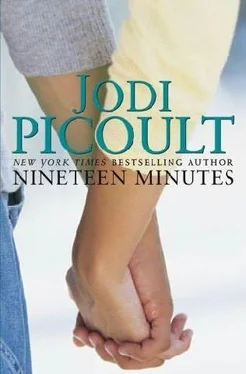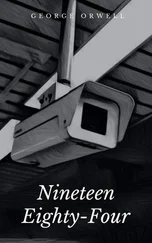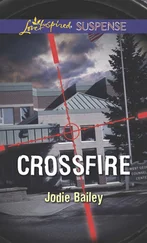“He asked me if I could read.”
All cops did; they were supposed to have the perp follow along with the Miranda rights. “And your response, apparently, was, ‘Hello, fucko, do I look like a moron?’”
Linus shrugged. “What was I supposed to say?”
Alex pinched the bridge of her nose. Her days in the public defender’s office were an exhausting blur of moments like this: a great amount of energy and time expended on behalf of someone who-a week, a month, a year later-would wind up sitting across from her again. And yet, what else was she qualified to do? This was the world she had chosen to inhabit.
Her beeper went off. Glancing at the number, she silenced it. “Linus, I think we’re going to have to plead this one out.”
She left Linus in the hands of a detention officer and ducked into the office of a secretary at the jail in order to borrow her phone. “Thank God,” Alex said when the person picked up on the other end. “You saved me from jumping out a second-story window at the jail.”
“You forgot, there are bars,” Whit Hobart said, laughing. “I used to think maybe they’d been installed not to keep the prisoners in, but to prevent their public defenders from running away when they realize how bad their cases are.”
Whit had been Alex’s boss when she’d joined the NH public defender’s office, but he had retired nine months ago. A legend in his own right, Whit had become the father she’d never had-one who, unlike her own, had praise for her instead of criticism. She wished Whit were here, now, instead of in some golf community on the seacoast. He’d take her out to lunch and tell her stories that made her realize every public defender had clients-and cases-like Linus. And then he’d somehow leave her with the bill and a renewed drive to get up and fight all over again.
“What are you doing up?” Alex said. “Early tee time?”
“Nah, damn gardener woke me with the leaf blower. What am I missing?”
“Nothing, really. Except the office isn’t the same without you. There’s a certain…energy missing.”
“Energy? You’re not becoming some New Age crystal-reading hack, are you, Al?”
Alex grinned. “No-”
“Good. Because that’s why I’m calling: I’ve got a job for you.”
“I already have a job. In fact, I have enough work for two jobs.”
“Three district courts in the area are posting a vacancy in the Bar News. You really ought to put your name in, Alex.”
“To be a judge?” She started to laugh. “Whit, what are you smoking these days?”
“You’d be good at it, Alex. You’re a fine decision maker. You’re even-tempered. You don’t let your emotions get in the way of your work. You have the defense perspective, so you understand the litigants. And you’ve always been an excellent trial attorney.” He hesitated. “Plus, it’s not too often that New Hampshire has a Democratic female governor picking a judge.”
“Thanks for the vote of confidence,” Alex said, “but I am so not the right person for that job.”
She knew, too, because her father had been a superior court justice. Alex could remember swinging around in his swivel chair, counting paper clips, running her thumbnail along the green felt surface of his spotless blotter to make a hatch-marked grid. She’d pick up the phone and talk to the dial tone. She’d pretend. And then inevitably her father would come in and berate her for disturbing a pencil or a file or-God forbid-himself.
On her belt, her beeper began to vibrate again. “Listen, I have to get to court. Maybe we can do lunch next week.”
“Judges’ hours are regular,” Whit added. “What time does Josie get home from school?”
“Whit-”
“Think about it,” he said, and then he hung up.
“Peter,” his mother sighed, “how could you possibly lose it again?” She skirted around his father, who was pouring himself a cup of coffee, and fished through the dark bowels of the pantry for a brown paper lunch sack.
Peter hated those sacks. The banana never could quite fit in, and the sandwich always got crushed. But what else was he supposed to do?
“What did he lose?” his father asked.
“His lunch box. For the third time this month.” His mother began to fill the brown bag-fruit and juice pack on the bottom, sandwich floating on top. She glanced at Peter, who was not eating his breakfast, but vivisecting his paper napkin with a knife. He had, so far, made the letters H and T. “If you procrastinate, you’re going to miss the bus.”
“You’ve got to start being responsible,” his father said.
When his father spoke, Peter pictured the words like smoke. They clouded up the room for a moment, but before you knew it, they’d be gone.
“For God’s sake, Lewis, he’s five.”
“I don’t remember Joey losing his lunch box three times during the first month of school.”
Peter sometimes watched his father playing soccer in the backyard with Joey. Their legs pumped like crazy pistons and gears-forward, backward, forward-as if they were doing a dance together with the ball caught between them. When Peter tried to join them, he got tangled up in his own frustration. The last time, he’d scored against himself by accident.
He looked over his shoulder at his parents. “I’m not Joey,” he said, and even though nobody answered, he could hear the reply: We know.
“Attorney Cormier?” Alex glanced up to find a former client standing in front of her desk, beaming from ear to ear.
It took her a moment to place him. Teddy MacDougal or MacDonald, something like that. She remembered the charge: simple assault domestic violence. He and his wife had gotten drunk and gone after each other. Alex had gotten him acquitted.
“I got somethin’ for ya,” Teddy said.
“I hope you didn’t buy me anything,” she answered, and she meant it-this was a man from the North Country who was so poor that the floor of his house was literally dirt and he stocked his freezer with the spoils of his own hunting. Alex was not a fan of hunting, but she understood that for some of her clients-like Teddy-it was not about sport, but survival. Which was exactly why a conviction for him would have been so devastating: it would have cost him his firearms.
“I didn’t buy it. Promise.” Teddy grinned. “It’s in my truck. Come on out.”
“Can’t you bring it in here?”
“Oh, no. No, can’t do that.”
Oh, excellent, Alex thought. What could he possibly have in his truck that he can’t bring in? She followed Teddy out to the parking lot and in the back of his pickup truck saw a huge, dead bear.
“This is for your freeza’,” he said.
“Teddy, this is enormous. You could eat it all winter.”
“Damn right. But I thoughta you.”
“Thank you so much. I really appreciate it. But I don’t, um, eat meat. And I wouldn’t want it to go to waste.” She touched his arm. “I really want you to have it.”
Teddy squinted into the sun. “All right.” He nodded at Alex, climbed into the cab of his truck, and bounced out of the parking lot as the bear thumped against the walls of the pickup bed.
“Alex!”
She turned to find her secretary standing in the doorway.
“A call from your daughter’s school just came in,” the secretary said. “Josie got sent to the principal’s office.”
Josie? In trouble at school? “For what?” Alex asked.
“She beat the crap out of a boy on the playground.”
Alex started toward her car. “Tell them I’m on my way.”
On the ride home, Alex stole glances at her daughter in the rearview mirror. Josie had gone to school this morning in a white cardigan and khaki pants; now that cardigan was streaked with dirt. There were twigs in her hair, which had fallen from its ponytail. The elbow of her sweater had a hole in it; her lip was still bleeding. And-here was the amazing thing-apparently, she’d fared better than the little boy she’d gone after.
Читать дальше












